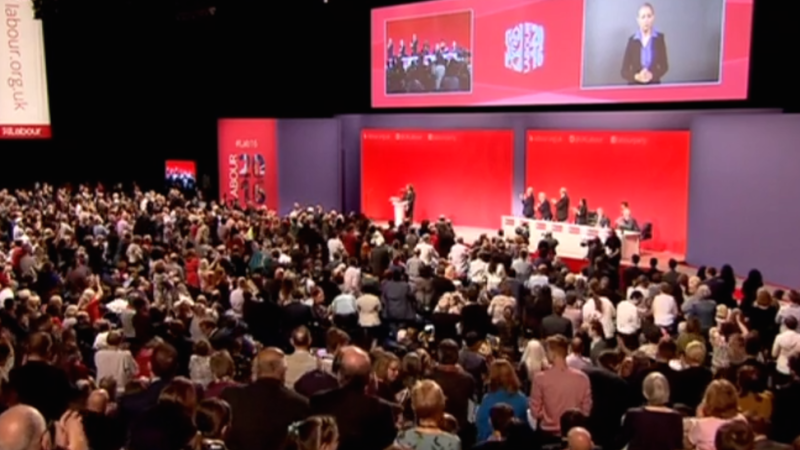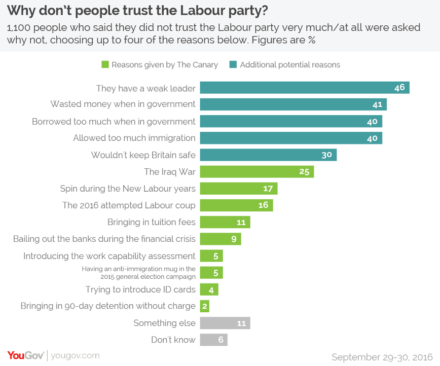
Having read a recent piece entitled catchily “I went undercover at the Labour Party conference, and what I saw left me speechless”, a couple of things jumped out at me.
Firstly, I was amazed at the good fortune the author had in overhearing conversations that perfectly suited their arguments and, secondly, the long list of why people didn’t trust Labour. Trust in politics is low across the board and, whilst a lack of trust isn’t singularly a Labour issue, it is important to understand why this trust is in short supply to better fight back against it and win over a sceptical public.
The Canary author, editor Kerry-Anne Mendoza, tells us:
“Kate Green…told the room that the Labour Party isn’t trusted anymore, without explaining why – seemingly attributing this lapse of trust to the arrival of Jeremy Corbyn. Which is strange, because if you ask most people why they don’t trust Labour, they will respond with one of the following.
- Iraq.
- Alastair Campbell’s spin machine.
- 90-day detention without charge.
- ID Cards.
- Tuition fees.
- The financial crisis/bank bailout.
- The work capability assessment.
- That anti-immigration mug.
- The 2016 attempted Labour coup.”
An interesting list but, I felt, lacking in a couple of areas that I have seen come up in research conducted over the past year. So I decided to test some of the reasons why people might not trust Labour. I needed to amend some of the wording to above reasons (for purely research reasons) and added in a few more:
Reasons The Canary gave
- The Iraq war
- Spin during the New Labour years
- The 2016 attempted Labour coup
- Bringing in tuition fees
- Bailing out the banks during the financial crisis
- Introducing the work capability assessment
- Having an anti-immigration mug in the 2015 General Election campaign
- Trying to introduce ID Cards
- Bringing in 90-day detention without charge.
Other potential reasons
- They have a weak leader
- They wasted money when in government
- They borrowed too much when in government
- They allowed too much immigration
- They wouldn’t keep Britain safe.
To test the idea of why people do not trust Labour, I first asked respondents how much, generally, they trusted the party and then, for those who said they didn’t trust Labour, I presented the full list above, asking them to choose four. And here is what I found; just 24 per cent trust the Labour Party, a further 10 per cent weren’t sure if they did or not and fully two thirds (66 per cent) said they did not trust Labour much (33 per cent) or at all (33 per cent). The results for the 66 per cent who said they did not trust Labour, in this survey 1,100 respondents, are presented below (The Canary’s reasons in green and additional suggestions in turquoise):
Surprisingly, not a single option suggested by The Canary ranked in the top five, edged out by every single other suggestion made. Indeed, the very thing the author of the original piece criticises Kate Green for (attributing this lapse of trust to the arrival of Jeremy Corbyn) is, well, the number one ranked reason. What the author of The Canary piece found as strange turns out to be true – though weakness of a leader is as much a perception thing as anything else.
This article hasn’t been written to attack the Labour Party, the leader or anyone associated with trying to make Labour electable but there is a huge problem here with trust, not with the Labour Party, but in trusting those who prophesise Labour’s future good fortune based on such a misguided view of reality.
To simply ignore why people say they don’t trust Labour will not help. You have to understand where the public is to take them on and convince them that you understand their concerns. Saying what you hope to be true and ignoring all evidence to the contrary will lead nowhere but, worse than that, it will lead to misdiagnosing the problems and failing to grasp the solutions.
This article also makes no reference to the solutions to these problems I have identified. There will be a Jeremy Corbyn solution to each of these as much as there could be a Tony Blair one but, crucially, there must be a solution to the problems the public say they have with the party. Failure to take them on by wishing it not to be true will lead to oblivion at the next election.
Labour must engage with the public as they are, not with the public as wished for by The Canary.
Laurence Janta-Lipinski works at YouGov.





More from LabourList
‘Labour’s quiet quest for democratic renewal’
‘Labour promised to make work pay. Now it must deliver for young people’
‘Council Tax shouldn’t punish those who have the least or those we owe the most’